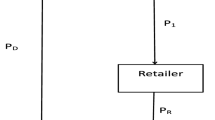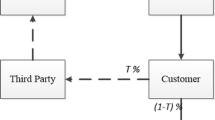Abstract
This paper is focused on a triopoly closed-loop supply chain (CLSC) game model, including triopoly oligopolies applying for circular economy development. In the CLSC model, manufacturers sell new products and re-collect waste products for maximizing their profits. This paper analyzes the game processing, the Nash equilibrium solutions, and the stability of the game model. Moreover, the influences of parameters on the system’s stability have been investigated, using the maximal Lyapunov exponent, bifurcation graph, and the stable domain. The results show that the system will be unstable when the adjustment speed of the manufacture is too high; unreasonable price strategies could easily cause system bifurcation; the critical point of system bifurcation is closely related to the collecting price.













Similar content being viewed by others
References
China Household Electrical Appliances Research Institute (2016) White paper on recycling and comprehensive utilization of waste electrical and electronic products in China. www.weee-epr.org. Accessed 24 May 2017
Dai D, Si F, Wang J (2017) Stability and complexity analysis of a dual-channel closed-loop supply chain with delayed decision under government intervention. Entropy 19(11):577
Ding J, Mei Q, Yao H (2012) Dynamics and adaptive control of a duopoly advertising model based on heterogeneous expectations. Nonlinear Dyn 67(1):129–138
Fang C, Liu X, Pei J et al (2016) Optimal production planning in a hybrid manufacturing and recovering system based on the internet of things with closed loop supply chains. Oper Res Int J 16(3):543–577
Gan SS, Pujawan IN, Suparno, Widodo B (2016) Pricing decision for new and remanufactured product in a closed-loop supply chain with separate sales-channel. Int J Prod Econ 190:120–132
Genc TS, De Giovanni P (2018) Optimal return and rebate mechanism in a closed-loop supply Chain game. Eur J Oper Res 269:661–681
General Office of the State Council (2016) Circular of the General Office of the State Council on the implementation of the extended producer responsibility system. http://www.gov.cn/zhengce/content/2017-01/03/content_5156043.htm. Accessed 2016
Georgiadis P, Athanasiou E (2013) Flexible long-term capacity planning in closed-loop supply chains with remanufacturing. Eur J Oper Res 225(1):44–58
Guide VDR Jr, Jayarman V, Linton JD (2003) Building contingence planning for closed-loop supply chains with product recovery. J Oper Manag 21(3):259–279
Guo YH, Ma JH (2013) Research on game model and complexity of retailer collecting and selling in closed-loop supply chain. Appl Math Model 37(7):5047–5058
Guo YH, Ma JH, Wang GH (2011) Modeling and analysis of recycling and remanufacturing systems by using repeated game model. Ind Eng J 14(5):66–70
Gutgutia A, Jha JK (2018) A closed-form solution for the distribution free continuous review integrated inventory model. Oper Res Int J 18(1):159–186
Jin CF, Cao EB, Lai MY (2012) Analysis on green marketing strategy of duopoly retailing market based on the evolutionary game theory. J Syst Eng 27(3):383–389
Li X, Yibiao W (2015) Differential price closed-loop supply chain under the government replacement-subsidy. Syst Eng Theory Pract 35(8):1983–1995
Ma J, Wang H (2014) Complexity analysis of dynamic noncooperative game models for closed-loop supply chain with product recovery. Appl Math Model 38(23):5562–5572
Ma WM, Zhao Z, Ke H (2013) Dual-channel closed-loop supply chain with government consumption-subsidy. Eur J Oper Res 226(2):221–227
Ma J et al (2018) Research on the complexity and chaos control about a closed-loop supply chain with dual-channel recycling and uncertain consumer perception. Complexity 9:1–13
Ministry of Commerce (2017) China regenerated resource recycling industry development report 2017. Resour Regener 2017(5):16–25
Qiang Q, Ke K, Anderson T et al (2013) The closed-loop supply chain network with competition, distribution channel investment, and uncertainties. Omega 41(2):186–194
Wang Q (2015) A Sino-American comparative research on extended producer responsibility of e-waste management. Central South University of Forestry and Technology
Wang W, Da QL, Nie R (2011) The study on pricing and coordination of closed-loop supply Chain considering channel power structure. Chin J Manag Sci 19(5):29–36
Xie L, Ma JH (2016) Study the complexity and control of the recycling-supply chain of China’s color TVs market based on the government subsidy. Commun Nonlinear Sci Numer Simul 38:102–116
Yi Y, Yuan J (2012) Pricing coordination of closed-loop supply chain in channel conflicts environment. J Manag Sci China 15(1):54–65
Zhang XM, Zhao M, Dan B (2013) Dynamic competition strategy of duopoly manufacturers with bounded rationality and service differentiation. Ind Eng J 16(4):28–32
Zheng Y, Shu T, Wang S et al (2016) Analysis of product return rate and price competition in two supply chains. Oper Res. https://doi.org/10.1007/s12351-016-0273-6
Acknowledgements
The authors would like to thank the reviewers for their careful reading and some pertinent suggestions.
Funding
Funding was provided by National Natural Science Foundation of China (Grant No. 71571131).
Author information
Authors and Affiliations
Corresponding author
Ethics declarations
Conflict of interest
The authors declare no conflict of interest regarding the publication of this paper.
Additional information
Publisher's Note
Springer Nature remains neutral with regard to jurisdictional claims in published maps and institutional affiliations.
Rights and permissions
About this article
Cite this article
Ma, J., Zhu, L. & Guo, Y. Strategies and stability study for a triopoly game considering product recovery based on closed-loop supply chain. Oper Res Int J 21, 2261–2282 (2021). https://doi.org/10.1007/s12351-019-00509-w
Received:
Revised:
Accepted:
Published:
Issue Date:
DOI: https://doi.org/10.1007/s12351-019-00509-w




